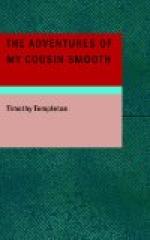“I soon muddled my way along with the crowd, among which there were very long faces, very short faces, and faces from which nothing could be extracted—the comic faces always kept behind! As a matter of policy I got behind the man who had the longest and most quizzical face; for he gave out signs of seeing daylight through political darkness. I made his acquaintance, and found him of the free-and-easy school. ‘On your way to see the General, stranger?’ I inquired, edging up to him in a polite sort of way—at the same time keeping up the free-and-easy. ‘No,’ he answered with a laconic air, and a half significant shrug of the shoulder, ’I’m merely strolling this way, leisurely contemplating. I take it you have not been long in the Capital?’ he added. ‘You are right on that point, citizen,’ said I in return.
“‘Expecting a good appointment?’ he continued to inquire, philosophically. ’Well, it may be: s’pose you’re in for a Ministership, if you come out a martyr,’ I replied, adding a Western wink which is given with both eyes. He very good-naturedly acknowledged that I had hit the mark, gave me his arm, said we must look in somewhere by the way-side and taste a small drop of Young American whiskey, which would have the effect of making stronger our friendship. This we did, drinking a good time to Mr. Pierce. No sooner was the whiskey down than all his ideas came straight up. He said he was none of yer small fry;—like thunder he had stumped it for General Pierce; like electricity he had down in Georgia and Western Alabama carried everything for true democracy. ’Reckon Mr. Smooth never was down South?’ he concluded, in parenthesis. I assured him I never was; but that I had heard it was great of office-holders, and persons who would, with every consideration for the Union in general, hold the federal government very fast. To this he merely bowed in confirmation. To another question, which was rather of a delicate nature, he said the South did not so much value the emoluments of office; but her sons reverenced the noble qualities of their forefathers, with whom dignity was inherent,—and it was they that were best qualified to maintain and spread its influence for the benefit of the nation. It was the dignity




